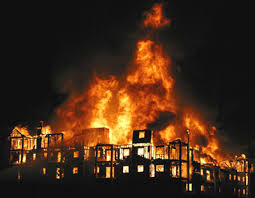记忆方法
将“arson”分解为“ar”和“son”。想象火灾(“ar”与“火焰”或“烧”相关联)由一个儿子(“son”)引起的,这个儿子不小心或故意点燃了房子。这样的图像可以帮助你记住这个单词,它指的是纵火罪。
以上内容由AI生成, 仅供参考和借鉴
中文词源
arson 纵火犯
来自词根ard, 火,燃烧。
英语词源
- arson
-
arson: [17] Like ardour and ardent, arson comes from the Latin verb ardēre ‘burn’. Its past participle was arsus, from which was formed the noun arsiō ‘act of burning’. This passed via Old French into Anglo-Norman as arson, and in fact was in use in the Anglo-Norman legal language of England from the 13th century onwards (it occurs in the Statute of Westminster 1275). The jurist Sir Matthew Hale was the first to use the word in a vernacular text, in 1680. Other words in English ultimately related to it include arid and probably ash, area, and azalea.
=> ardour, area, ash, azalea - arson (n.)
- 1670s, from Anglo-French arsoun (late 13c.), Old French arsion, from Late Latin arsionem (nominative arsio) "a burning," noun of action from past participle stem of Latin ardere "to burn," from PIE root *as- "to burn, glow" (see ash (n.1)). The Old English term was bærnet, literally "burning;" and Coke has indictment of burning (1640).
权威例句
- 1. Seven men, all from Bristol, admitted conspiracy to commit arson.
- 7个人都来自布里斯托尔,他们承认了合谋纵火。
- 2. to carry out an arson attack
- 进行纵火袭击
- 3. The jury convicted the accused man of theft and arson.
- 陪审团宣判被告犯有偷窃和纵火罪.
- 4. The arson is professional.
- 放火是内行人干的.
- 5. The police suspect arson.
- 警方怀疑有人纵火.

